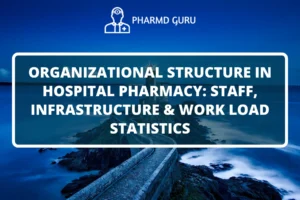The Pharmacy and Therapeutics Committee is a crucial component of healthcare organizations, particularly in hospitals and healthcare systems. It plays a vital role in ensuring the safe, effective, and appropriate use of medications within the organization. This article provides an overview of the roles and responsibilities of the Pharmacy and Therapeutics Committee.
SCROLL DOWN TO THE BOTTOM OF THE PAGE FOR ACTUAL NOTES
Definition of the Pharmacy and Therapeutics Committee
The Pharmacy and Therapeutics Committee is a multidisciplinary group comprised of healthcare professionals, including pharmacists, physicians, nurses, and other experts. The committee is responsible for making evidence-based decisions regarding the selection, utilization, and management of medications within the organization.
Roles and Responsibilities of the Pharmacy and Therapeutics Committee
- Formulary Development: The committee is responsible for developing and maintaining the organization’s medication formulary. The formulary is a list of medications approved for use within the organization, taking into account factors such as safety, efficacy, cost-effectiveness, and availability.
- Medication Evaluation: The committee reviews and evaluates new medications or therapeutic alternatives to existing medications. They assess the clinical evidence, safety profiles, comparative effectiveness, and cost considerations of these medications. Based on their evaluation, the committee makes recommendations regarding the inclusion or exclusion of medications from the formulary.
- Medication Use Policies: The committee establishes medication use policies and guidelines to ensure the safe and appropriate use of medications within the organization. These policies may include dosage guidelines, medication administration protocols, medication safety initiatives, and strategies to prevent medication errors.
- Therapeutic Interchange: The committee may evaluate therapeutic alternatives within the same drug class and recommend interchangeability between medications based on clinical evidence and cost-effectiveness. This allows for the use of equally effective medications while considering affordability and accessibility.
- Medication Safety and Adverse Event Monitoring: The Pharmacy and Therapeutics Committee is responsible for monitoring medication safety and adverse events within the organization. They review medication-related adverse events, near misses, and medication error reports to identify trends, implement corrective actions, and promote patient safety.
- Evidence-Based Medicine: The committee ensures that medication-related decisions are based on current, evidence-based medicine. They stay abreast of new clinical research, guidelines, and emerging therapies to inform their recommendations regarding medication selection and utilization.
- Pharmacy and Therapeutics Subcommittee: The committee may establish subcommittees or working groups to focus on specific therapeutic areas or medication classes. These subcommittees conduct in-depth reviews and evaluations of medications within their respective areas of expertise and make recommendations to the larger committee.
- Education and Training: The Pharmacy and Therapeutics Committee provides educational resources and training to healthcare professionals within the organization. They may organize seminars, workshops, or educational sessions to enhance knowledge about medication-related topics, such as new drug updates, medication safety, and therapeutic guidelines.
- Collaboration with Other Committees: The committee collaborates with other committees and departments within the organization to ensure coordination and integration of medication-related policies and practices. This includes collaborating with the Quality Improvement Committee, Infection Control Committee, and others to promote medication safety and optimize patient outcomes.
- Medication Cost Management: The Pharmacy and Therapeutics Committee considers cost-effectiveness when evaluating medications for inclusion in the formulary. They work closely with the hospital’s finance and procurement departments to optimize medication costs while maintaining quality patient care.
ACTUAL NOTES




